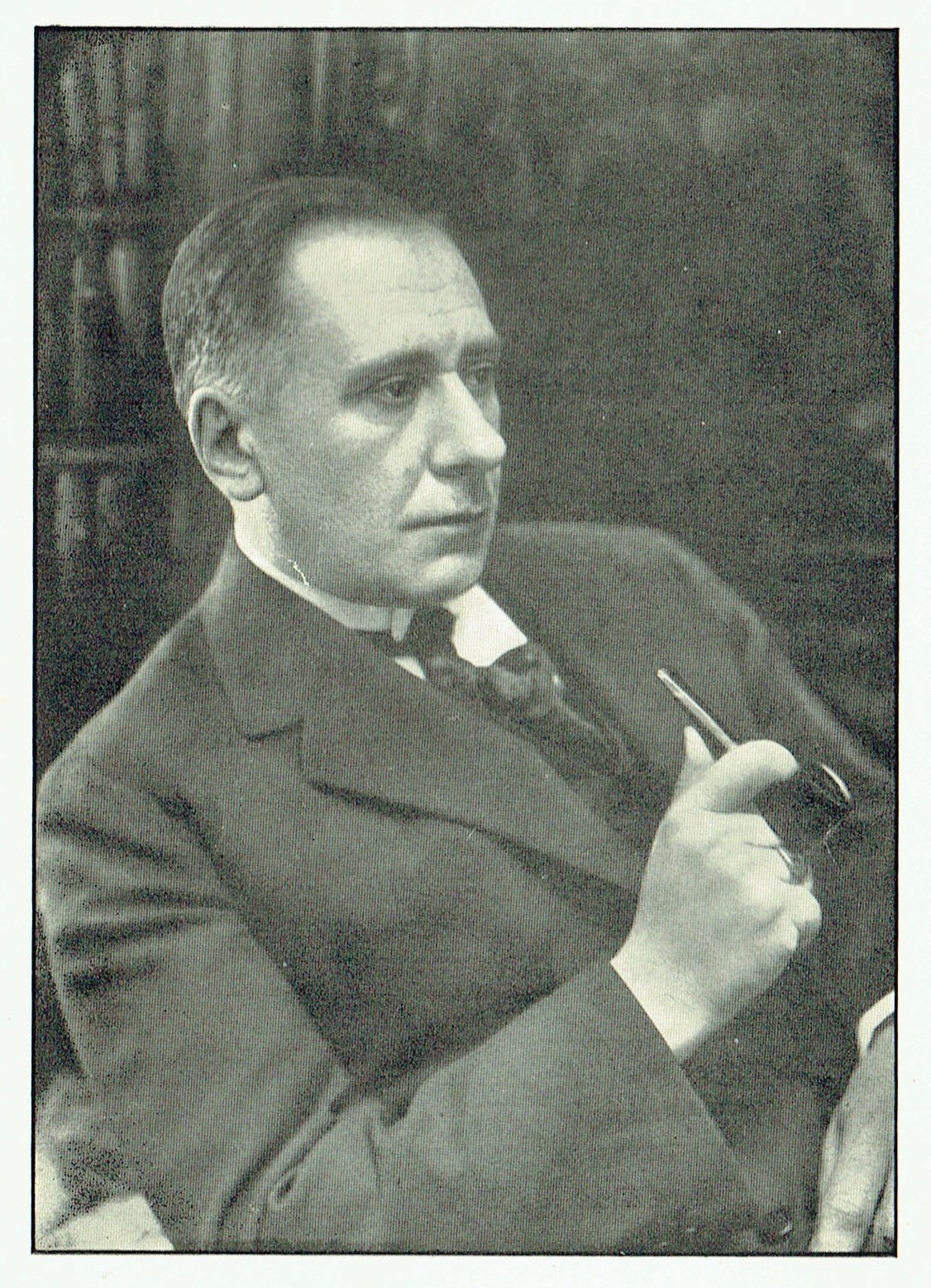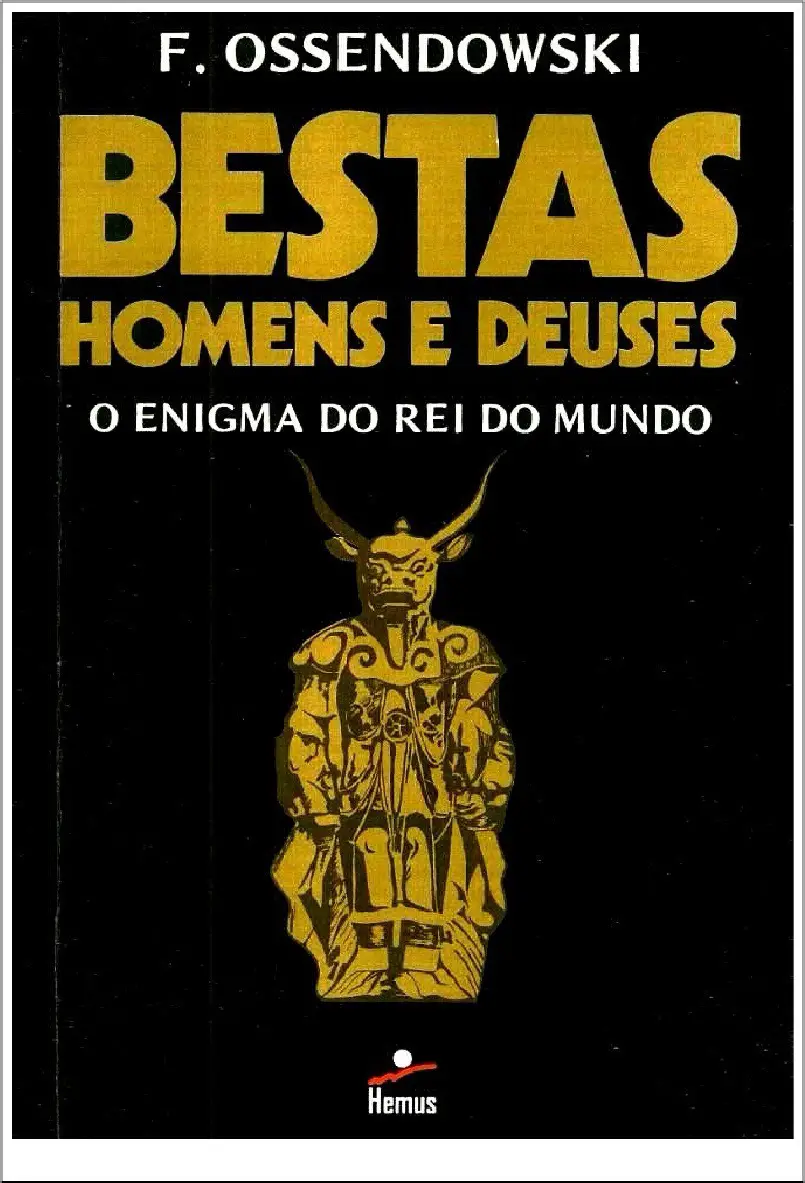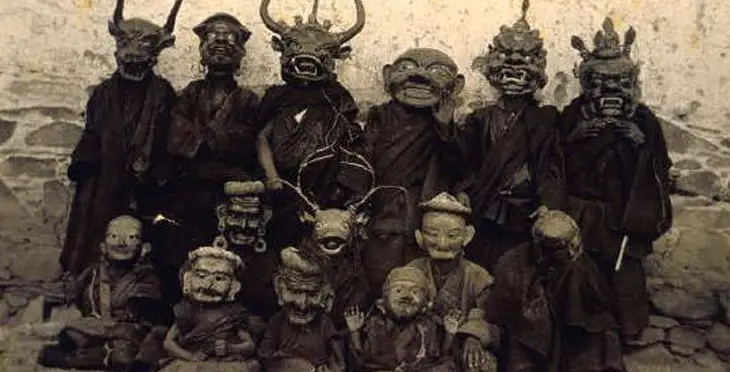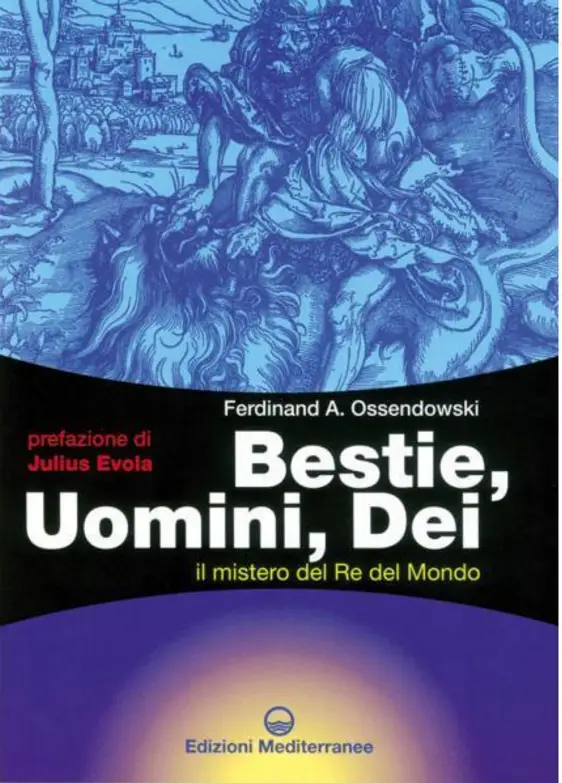Ferdinand Ossendowski's travel report through Central Asia is a precious testimony of the geopolitical upheavals of the early 900s, but what emerges above all are the "magical" beliefs and the atavistic superstitions of the Himalayan highlands.
di Daniel Palmieri
In Europe, between 1910 and 1924, two singular texts were published: Mission of the Inde en Europe by Saint-Yves d'Alveydre e Beasts, men, gods by Ferdinand Ossendowski. Two very different travel accounts, yet linked by a common thread that attracted the attention of one of the most important traditionalists of the twentieth century: René Guénon. In both texts it is narrated of a legendary underground land, located in an unspecified place in Asia; the mythical agartha (or Needles, depending on the version). A city hidden in the bowels of the earth where an "enlightened" population would live, led by a mysterious King-Priest called the King of the World.
The similarities between the stories of Saint-Yves and Ossendowski are so many that many critics began to doubt the good faith of the second, accusing him of plagiarism. In defense not only of Ossendowski but, in general, of the myth of Agartha, the voice of the Guenon, which in a short pamphlet entitled, in fact, The King of the World, he analyzed as the myth of an underground civilization [1], spiritual pole of humanity, is much older than the stories of the two authors and stressed that the similarities, rather than a direct influence, derive instead from an idea rooted in human consciousness, common in different traditions.
Beyond Guénon's defense, it would be enough to read in full Beasts, men, gods by Ossendowski to discover how, beyond the narration of the myth of the King of the World, treated only in the concluding chapters of the text, much more is hidden: Beasts, Men, Gods it is one of the most beautiful travel reports I have ever read and, probably, one of the most evocative ever written.

Born in Vitebsk in 1871, Ferdinand Ossendowski was a Polish chemist, journalist, revolutionary and writer who, following the failure of Eastern Siberia's attempt at independence from Russia, had to flee the Bolsheviks in order not to fall victim to their roundups. The long journey, which will take him from Siberia to Beijing, he began "in the deep stillness of the Siberian winter», In 1920. Like the greatest adventures, it suddenly began when Ossendowski, on his way back from a friend's house, received the news that his home was guarded by Bolshevik soldiers, and that he had to leave the country immediately so as not to be imprisoned. .
«therefore»Writes Ossendowski in the opening of the text,«I hastily put on my friend's old hunting suit, took some money and hurried on foot along the narrow streets of the city, until I reached the main road outside the town; here I hired a farmer who in four hours drove me in his cart thirty kilometers away» [2].
The unexpected event found him unprepared, and immediately Ossendowski was forced to adapt to a completely different life, far from the comforts of domestic existence. Retrieving only his rifle, knife, water bottle and some food supplies, Ossendowski flees into the forests, similar to the Waldganger of Jungherian memory. Halfway between Walden of Thoreu and the Call of the forest of London, the first part of Beasts, men, gods by Ossendowski tells of his "regression" to a man of the forest, forced to live on the essentials, to get food by hunting, to survive the extreme conditions of the Siberian winter, to hide from Bolshevik soldiers, to refine his intuition about people met and understand, with a few glances, who could be trusted and who could not, even to face the wild animals of the Siberian forests. Particularly suggestive, in this regard, the battle with a bear that was prowling near his camp, which awakens in the author's soul the primordial instincts that, for millennia, have allowed man to survive the most extreme conditions, and which now lie dormant and helpless, but not completely forgotten, in the soul of each man. Thus, the first part of the text takes on the appearance of an initiatory incubation, in which Ossendowski awakens the deeper energies latent in his soul. As he himself writes in the book [3]:
“In every spiritually healthy individual of our time, there are still traits of primitive man that can re-emerge in conditions of extreme difficulty, transforming him into a hunter and warrior, and help him to survive in the struggle with Nature. It is a prerogative of the man with a tempered mind and spirit, while others who do not possess sufficient knowledge and willpower are doomed to succumb. But the price that civilized man has to pay is that for him there is nothing more frightening than absolute solitude and the awareness of complete isolation from the human consortium and the culture in which he was formed. One misstep, one moment of weakness and black madness will take hold of him, dragging him towards inevitable destruction. I had spent terrible days battling cold and hunger pangs, but I had even more terrifying ones struggling with willpower against destructive thoughts, which weakened me psychologically. [...] Furthermore, I was forced to observe that the so-called civilized people attach little importance to that training of the spirit and of the body which is indispensable to man who finds himself in primitive conditions, in the ruthless struggle for survival in a hostile Nature and wild. IS this is the way to educate a new generation of healthy, strong, iron men, who at the same time preserve sensitive souls. Nature annihilates the weak but hardens the strong, awakening in the soul dormant emotions in the normal living conditions of today's civilization. "

To escape the Bolshevik advance, Ossendowski is forced to go further and further into the deep heart of Asia, through Mongolia and Tibet, driven by such atavistic energies and by a strenuous will that keeps him clinging to life even in the most difficult and dangerous moments. Between gun battles, travel companions met and lost, escapes and betrayals, the Polish writer crosses the threshold of an Asia with a great cultural, religious, spiritual and political ferment (and fervor). The more he goes into the lands of the East, the more the journey is filled with beliefs, folklore, superstition, magic and wonder, through the words of the natives and their tales about demons of the peaks who preside over passages, gods of the wind that unleash storms, ghosts and spirits of ancestors who scrutinize the lives of men, fortune-tellers who foretell impending fortunes and misfortunes, all reported with a style objective and journalistic, but not for this arid and dry. With his prose, Ossendowski is able to never fall into simple credulity or arid skepticism, but always objective and detached he reports stories and events with a sort of gaze from above, at the same time realistic and enchanted.
In addition to a great travel story, Beasts, men, gods it is an important source on the history of the political upheavals that took place between Siberia, Mongolia and Tibet in the first half of the 900th century. Among the most important testimonies, Ossendowski's encounter with the bloodthirsty Baron von Ungern, a Russian military man of German origin who tried to found, in Mongolia, a theocratic Lamaist monarchy, founded on the mystical and spiritual principles of a syncretic Buddhism, which mixed nationalist elements with the principles of Tibetan-derived Buddhism, with Chinese and Mongolian influences [4]. Memorable are the words with which Ossendowski describes his first meeting the Baron [5]:
“As I crossed the threshold a man dressed in a red Mongolian silk robe pounced on me with the snap of a tiger, grabbed me and shook my hand hastily and then threw himself on the bed set along one side of the curtain. […] In an instant I realized his appearance and his character. A small head on broad shoulders; unkempt blond hair; reddish brush mustache; a tired and emaciated face like those of ancient Byzantine icons. But the most characteristic feature of his features was the spacious protruding forehead that overlooked two piercing eyes, with a steely gaze, which looked at me like those of an animal at the bottom of a cave. My examination lasted a moment, but I knew immediately that I was facing a very dangerous man, ready to give an irrevocable order. "
The military / dictator, after this initial meeting in which Ossendowski will be able to attract his sympathies, will escort the author to the home of the so-called Living Buddha, the spiritual guide of the self-proclaimed lamaist state and, officially, its emperor, who before the eyes of Oossendowski foretells the death of the Bloody Baron, and his reincarnation into an even greater warrior spirit. In Ossendowski's eyes, the Living Buddha, with his contradictions, his greatness and his pettiness, becomes the perfect embodiment of Lamaist spirituality, always poised between heaven and earth, matter and spirit, asceticism and opulence [6]:
«Intelligent, penetrating, energetic, he indulges at the same time the vice of drinking, which has caused him blindness […]. He never stops meditating on the cause of his Church and Mongolia and at the same time indulges in small quirks. For example, he likes artillery […]. Cars, gramophones, telephones, crystals, china, paintings, perfumes, musical instruments, rare animals and birds, elephants, Himalayan bears, Indian snakes and parrots ... this and more found its place in the god's palace, but was soon set aside and forgotten. […] He showed me all the pieces of the museum, talking to me at length with evident pleasure. "

But under the superficial and contingent veil of political upheavals, human weaknesses, superstitions, blood and atrocities, the authentic spirit of a atavistic sacredness, which has been in the heart of Mongolia for millennia [7]:
«Have you ever seen the dusty cobwebs and molds in the basement of some ancient castle in Italy, France or England? It is the dust of the ages. Perhaps the same one that touched the face, helmet and sword of a Roman emperor, of St. Louis, of the Grand Inquisitor, of Galileo or of King Richard. Your heart beats faster and you feel full of respect for this silent testimony of distant ages. I felt the same impression in Ta Kure, but perhaps with greater intensity. Here life flows with the same rhythm of eight centuries ago; here men live immersed in the past, and the world of the past does nothing but complicate and hinder their normal existence. "
Testimony of this ancestral spirituality, the Mystery of Mysteries, the myth of the King of the World. As mentioned above, criticism has often focused solely on these pages, without considering the context of Ossendowki's entire journey, in the light of which this testimony should be read. First of all, it should be emphasized that several times, along his long journey, the author testifies to having heard, from the mouths of the natives, the legend of Agartha, of the underground kingdom and its enlightened ruler, who retreated into the bowels of the earth. Constant presence but always in the background, like a shadow, the King of the World seems to follow Ossendowski with his mind's eye throughout the journey, and even more than the words of the people and the Living Buddha, to amaze Ossendowski is a silent and intangible encounter. with the golden mystique of this legendary ruler [8]:
“Did you see, asked the Mongolian, how our camels moved their ears in fear? How did the herd of horses on the prairie stop suddenly alert and how did the flocks of sheep and herds crouch on the ground? Have you noticed that the birds have stopped flying, the marmots have stopped running and the dogs have barked? The air was filled with a subdued vibration and carried the music of a song from afar that went straight to the hearts of men, animals and birds. The earth and the sky held their breath. The wind stopped blowing and the sun was still. In such moments the wolf approaching the sheep stops its stealthy crawl; the herd of frightened antelopes suddenly interrupts his wild run; the shepherd's knife about to cut the sheep's throat falls from his hand. All living creatures, in the grip of a mysterious fear, involuntarily begin to pray, awaiting their fate. […] And so it has always been whenever the King of the World prays in his underground palace and sifts the fate of all the peoples of the Earth. "
In the light of Ossendowski's entire story, always poised between reality, legend and political and spiritual needs, the myth of the King of the World assumes prophetic characters, becomes a sort of wish and warning to the spiritual renewal of all humanity. As previously mentioned, in the first part of the book, in conjunction with the hard life in the woods and the awakening of the atavistic will, Ossendowski comes to imagine a different humanity that has regained contact with the ancestral, almost primordial forces of its own being, without however losing its art, nobility and delicacy. Narrating his autobiographical travails, Ossendowski seems to tell, at the same time, the sufferings and wars of all humanity and, both for the author and for men, the legendary land of Agartha takes on the characteristics of a saving hope in a land different, an earthly as well as metaphorical dimension in which man has rediscovered his own spiritual center, the Edenic condition ofGolden Age. The myth of the King of the World represents just that; the recovery of a higher spiritual pole, hidden however in the depths of the earth, in a point of contact between the celestial and telluric forces. From this perspective, all the other criticisms, rumors, suppositions around Ossendowski's text [9] they are nothing but feeble contingencies.

Note:
[1] See M. Maculotti, "Underground" civilizations in myth, occultism and "alternative reality", on AXIS mundi.
[2] F. Ossendowski, Beasts, men, gods, Edizioni Mediterranee, Rome 2003, p. 25.
[3] Ivi, p. 40.
[4] See A. Della Guerra, Von Ungern-Sternberg's religiosity: between Buddhism, shamanism and Christianity, on AXIS mundi.
[5] F.Ossendowski, op. cit., pp. 173-174.
[6] Ivi, p. 208.
[7] Ivi, p. 213.
[8] Ivi, p. 227.
[9] For a meaningful excerpt of Beasts, men, gods you see The Underground Kingdom (F. Ossendowski, "Beasts, Men, Gods"), on AXIS mundi.

7 comments on “Beasts, Men, Gods"